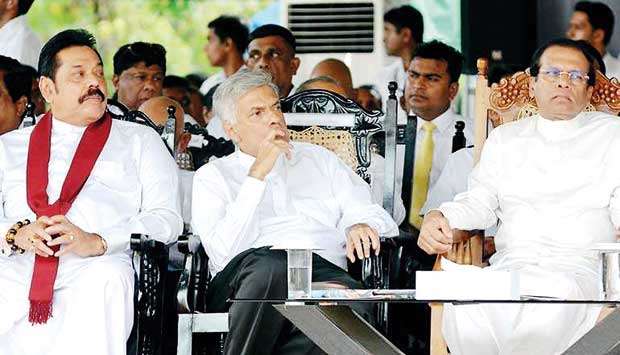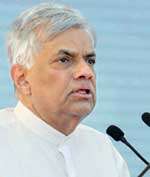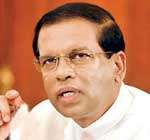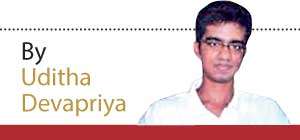The halo slips: What the UNP lost


“Maithripala Sirisena is a decision I don’t regret.”
- Ranil Wickremesinghe

“I believe that Mr. Wickremesinghe and his group of closest friends, who belonged to a privileged class and did not understand the pulse of the people, conducted themselves as if shaping the future of the country was a fun game.”
- Mathripala Sirisena

Political alliances are marriages of convenience. When nothing warrants them, they become a convenient front against a common enemy. But when that common enemy forms an outfit far more popular (that is, outside the parliament) than the coalition and its allies, rifts are bound to materialise. It’s not easy to hide those rifts. Sooner or later, they are bound to lead to a collapse. And the more the collapse of these alliances gets delayed, the worse it gets for everyone.
In other words, the UNP and UPFA, by carrying on a premature dalliance for more than three years, screwed the people. There was nothing that called for the coming together of these two traditional foes. It was merely a front against one man. Mahinda Rajapaksa. You can argue that, yes, he was getting it into his head that he was a king (and not the “temporary custodian” he said he was in 2005) of this country, but even accounting for this, the coalition was a convenient way of battling an inconvenient political future. Inconvenient, that is, to Ranil Wickremesinghe.
When the likes of Ajith Perera and Mangala Samaraweera claim that the people are on their side and that they will somehow prevail, I get amused. “The people” gave up this government a long time ago. “The people” voted for an outfit the UNP and UPFA had excluded from the legislature for more than three years. “The people” roundly rejected the IMF-driven measures the government was imposing on those who had no access to the car permits or privileges those they had helped bring to power were indulging in. “The people” were getting tired of the small victories that were being scored and the larger victories that were being evaded.
In other words, “the people” were showing signs of disenchantment. The government, by trivialising those signs, was being very stupid. And the result of that stupidity was the most unconstitutional coup an opposition could bring about, with the collaboration of the President, in the history of this country.
The Mahinda-Maithripala alliance was promoted by two ideologically different camps driven by one goal: a front against the enemy. Nalin de Silva was in one camp, Dayan Jayatilleka in the other. But given that most of Rajapaksa’s supporters wanted the man to go alone, such an alliance seemed inconceivable. To put it into perspective, it was much easier to imagine Mahinda and Chandrika in the same room.
And yet, here we are.
Whether it was the best combination, whether it will go up or come down, time will tell. In the meantime, we can confidently say this: that the alliance represents, outside the parameters of constitutional legality and legitimacy, a political expression of the people’s fury against the UNP government. One would have to be a kepuwath kola type or an Old Left apologist to claim otherwise.
How did it come about, though?
The UNP-UPFA coalition moved ahead with a programme that was “social democratic”. It was hard to find out which side of the political spectrum it belonged to, because it belonged to a mishmash of conflicting ideologies, from the Jathika Hela Urumaya’s sustainability drive to the UNP’s pro-business programme. As long as the coalition stuck to its reformist manifesto, however, this didn’t matter.
 It mattered when the parties tried to translate that manifesto to a meaningful economic programme. To put it briefly, one party had its roots in a populist platform, while the other, despite its championing of a vaguely defined social market economy, had its roots in a compradore, pro-privatisation agenda. It was easy to square the reformist thrust of the political programme with the populist roots of the UPFA. It was harder, though, to square it with the austerity measures the UNP was imposing on the people, ironically in their own name.
It mattered when the parties tried to translate that manifesto to a meaningful economic programme. To put it briefly, one party had its roots in a populist platform, while the other, despite its championing of a vaguely defined social market economy, had its roots in a compradore, pro-privatisation agenda. It was easy to square the reformist thrust of the political programme with the populist roots of the UPFA. It was harder, though, to square it with the austerity measures the UNP was imposing on the people, ironically in their own name. The ultimate snub came, for me, when Mangala Samaraweera held a placard bearing an equation that was supposed to be the fuel price formula. No, it was not the equation that infuriated the people. It was the image of Samaraweera and Eran Wickramaratne laughing. With themselves. At a press conference. The symbolism was hard to put off: the political elite, in an air-conditioned room, trivialising a formula that was crushing the people, most of whom had voted for them in 2015. The joke was on those same people. How could you not expect a backlash from them?
There’s more.
"When the likes of Ajith Perera and Mangala Samaraweera claim that the people are on their side and that they will somehow prevail, I get amused. “The people” gave up this government a long time ago. “The people” voted for an outfit the UNP and UPFA had excluded from the legislature for more than three years"
For decades, the UNP was associated with an anti-rural, anti-Sinhala, anti-Buddhist face. This was known. What was also known, though more recently, was the crass elitism that the UNP kowtowed to, after the 2015 election.
In March 2015 the New York Times ran an article (“A Cricket Match with Politics in the Spotlight”) that dwelt on the Big Match and its place in a regime dominated by the Prime Minister’s Old Boys. The implication was clear: the members of the Club came from more inclusive backgrounds, while the Rajapaksas, who had lost power, came from a background that rejected such inclusiveness. It was a triumph of elitism over ethnicity, underscored by the decision of the Prime Minister to appoint many of the members of the Club to the government. As Gayantha Karunathilaka and Harsha de Silva, quoted in the article, put it, they were bringing the “values” they had picked up from their school to the country. Rajpal Abeynayake, who criticised the UNP, put this into perspective rather cynically, “They are back in charge now.” Harsha added, not a little jubilantly, “And everyone here [at the Match] is celebrating that.”
In March 2015 the New York Times ran an article (“A Cricket Match with Politics in the Spotlight”) that dwelt on the Big Match and its place in a regime dominated by the Prime Minister’s Old Boys. The implication was clear: the members of the Club came from more inclusive backgrounds, while the Rajapaksas, who had lost power, came from a background that rejected such inclusiveness. It was a triumph of elitism over ethnicity, underscored by the decision of the Prime Minister to appoint many of the members of the Club to the government. As Gayantha Karunathilaka and Harsha de Silva, quoted in the article, put it, they were bringing the “values” they had picked up from their school to the country. Rajpal Abeynayake, who criticised the UNP, put this into perspective rather cynically, “They are back in charge now.” Harsha added, not a little jubilantly, “And everyone here [at the Match] is celebrating that.”
The UNP “came to power” in 2015 with a set of beliefs which led them to impose external, ethnic, and security policies that, as Dayan Jayatilleka implied in an article written hours after Sirisena appointed Rajapaksa, “affronted the national identity of a majority.” It was a set of beliefs cut off from the people. A set of beliefs more at home in Reid Avenue than in Ruwanwella. A set of beliefs rooted in a crass form of elitism, as shown when, for instance, Ranil was praised by his Reid Avenue worshippers for “making use” of Maithripala (an act that was seen for what it was: a member of the elite enriching himself through an outsider who could never join his ranks). It was, from a sociological perspective at least, fascinating. But also repelling.
I distinctly remember the kind of sentiments harboured by those who affirmed this outlook. It was based on certain crude political differentiations. The Rajapaksas stood for the past, our heritage, the UNP stood for the future, our destiny. The Rajapaksas stood for the old, the UNP stood for the young. The Rajapaksas would take us to the nagula, the UNP would take us to an industrial hub. The Rajapaksas were bumpkins, the UNP were of a more refined order. The Rajapaksas were savages from Beliatta, the UNP were gentlemen from Kurunduwatte.
" Ranil was praised by his Reid Avenue worshippers for “making use” of Maithripala (an act that was seen for what it was: a member of the elite enriching himself through an outsider who could never join his ranks)"
There was one post in particular that made the rounds on social media. It carried a photo of Ranil and it bore the following caption: “I may not carry your baby, but I care more for your child’s future than those who can.” An entire generation who had grown to admire the man on the basis on his school tie, and elitist credentials, voted for the UNP believing in that message. It was simply too hard to resist.
Where are we now, though? Closer to Reid Avenue, yet far, far away from Sri Lanka.
For three years, the UNP spread the myth that only those who came from their class (and schools) could do and deliver. Well, it turned out that they could neither do nor deliver. The beliefs they bandied have, clearly, gone to the dogs. While I do not claim this is the reason behind the indifference of the people towards the perceived illegality of Maithripala Sirisena’s appointment of his old foe, I would say that the politics of Reid Avenue, which estranged us all from this government, added fuel to the fury of the common citizen. It has undressed itself, and failed. “The people”, whom Mangala Samaraweera claims are on “their side”, have given up on them. And why? Because the UNP and those “Old Boys” have done them all in.
Where are we now, though? Closer to Reid Avenue, yet far, far away from Sri Lanka.
For three years, the UNP spread the myth that only those who came from their class (and schools) could do and deliver. Well, it turned out that they could neither do nor deliver. The beliefs they bandied have, clearly, gone to the dogs. While I do not claim this is the reason behind the indifference of the people towards the perceived illegality of Maithripala Sirisena’s appointment of his old foe, I would say that the politics of Reid Avenue, which estranged us all from this government, added fuel to the fury of the common citizen. It has undressed itself, and failed. “The people”, whom Mangala Samaraweera claims are on “their side”, have given up on them. And why? Because the UNP and those “Old Boys” have done them all in.

